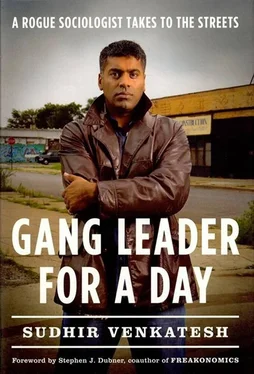Still, there was hope in the air. Because of Bill Clinton’s overwhelming popularity among African Americans, even the most cynical tenants-including the people whose cars had been towed- were excited about his visit. Tenant leaders led campaigns to spruce up their buildings’ lobbies, hallways, and playgrounds. Tenant patrols went door-to-door asking people to tidy up their living rooms and clean their toilets; in one building, snakes and other strange pets were confiscated from certain households. And throughout the project, aged flower beds sprang to life.
In the early days of Robert Taylor, the buildings had competed against one another with flower gardens and other beautification projects. This dormant practice was now reborn in anticipation of the president’s visit. He obviously couldn’t visit all twenty-eight Robert Taylor buildings, and he might have time for just one. But this only heightened the intensity of the competition. A few tenant leaders called in favors with city officials to try to make sure their building was on the president’s list. Some of them curried additional favor by turning in drug dealers to the police.
The 5011 building, located on the far south side of Robert Taylor, showed particular enthusiasm. This was fueled by the belief that a new construction project next door to 5011 was in fact the construction of a presidential podium. The tenant leader taxed the local gang twenty-five hundred dollars to fund a wide-scale restoration effort. The building’s children were given new clothes and shoes; a mural of historic African-American figures was painted along the building’s ground floor; a few particularly civic-minded tenants even wrote speeches, just in case the president called them up to the podium. And families planted rows and rows of flowers in a garden that had seen nothing but trash for years.
By the morning of June 17, 1994, the day of President Clinton’s visit, the residents of 5011 were fully ready. But his entourage sped past quickly, without so much as a wave. He gave his speech in another part of Robert Taylor. A few of the tenants in 5011 moaned and groaned, but generally they were satisfied that the president had showed up at all. Parents broke out soda and beer, and their kids caught the spirit and launched a party. After the initial disappointment, no one seemed willing to utter a spiteful word. For a time at least, the community shared a deep spirit of satisfaction, of having pulled together. Over and over again, you could hear tenants remark that they hadn’t seen such solidarity in decades.
Now, a year later, the flower bed outside J.T.’s building stood as a similar sign of hope-and, in light of the imminent demolition of the projects, a sign of proud obstinacy.
The back-to-school party was in full swing. Kids and grown-ups alike loaded their plates with food. A softball game started up, and a crowd of people gathered to watch. I milled about, saying hello to a lot of people I hadn’t seen in a while.
Suddenly the sound of gunshots pierced the air, and everyone ran for cover. There were four or five shots, rapid fire, from what sounded like a pistol. Parents grabbed their kids and ducked behind cars or ran for the lobby. Above the blaring music, you could hear women screaming for their children. J.T. hollered for everyone to get down.
I found myself crouching behind a car parked near the building. Beside me were a few of J.T.’s foot soldiers, young men I barely knew. I asked where the shooting was coming from. They immediately pointed up toward the upper floors of the building.
“Niggers are probably high on dope,” one of them whispered. “Or else you got an MC who snuck up in the building. It used to be an MC building before we took it over.”
Some distance away I could see a thin, dark-skinned woman staggering toward us across the grassy expanse in front of the building. Her clothes were sloppy, and she was practically falling down, probably either drunk or high. As she came closer, you could hear her talking to herself, most of it gibberish. People started yelling at her to take cover. A few of J.T.’s men shouted nasty names and threw beer bottles at her. It was pretty common for drug dealers to treat drug users with disdain; they often justified their line of work by pointing out that they took money from the most useless members of the community.
Some more shots rang out from above, the bullets kicking up clouds of dirt a few feet from the woman.
“That ain’t the MCs firing at us,” said the foot soldier beside me. “That’s just some nigger who is fucked up and looking to cause trouble.”
Finally an older gentleman ran out, grabbed the staggering woman, and hustled her into the lobby. After about ten minutes with no more gunfire, most people felt comfortable enough to come out from their hiding places. Parents and children ran into the building, abandoning the party. The squatters and the hustlers, meanwhile, got back to their food and listened to the music. My heart kept racing for several minutes, but even I wasn’t surprised by now that nobody even bothered to call the police.
In the spring of 1996, I learned that I had received a junior fel-lowship at Harvard’s Society of Fellows. I was ecstatic; it was a much-sought-after position, a three-year salaried research post. I went to tell J.T. the good news, and that I would soon be leaving town, although I still planned to maintain my ties to Chicago.
The smells of Ms. Mae’s cooking-collard greens, cornbread, and smothered chicken-hit me as I walked in the door. “You still manage to get here right when the food is ready, don’t you?” J.T. said with a laugh.
I apologized for missing the last few suburban Black Kings meetings.
“They still think you’re the director of communications,” he said, laughing again but looking at the TV instead of at me. “There’s another meeting next Sunday if you want to come with me.”
“Sure,” I said, trying to sound enthusiastic. “That would be great.” I explained why I’d been so busy lately. Until I learned of the Harvardfellowship, I had been applying for teaching jobs at universities all over the country, including Columbia University in New York.
J.T. interrupted my explanation. “You remember Curtis, that tall, dark boy you met?” He suddenly sat up and began to speak with great enthusiasm. “Curtis is from New Jersey, or at least he has work out there. Hey, what do you think about heading out there with me? I’ve been wanting to go and see how they do things. He and I have this bet. He says the women are hotter in his projects. Says I should come out and see.”
I did remember Curtis, a nerdy-looking drug dealer who worked out of the housing projects in Newark. We had exchanged a few words at most when he came to visit J.T. about a year earlier.
“Somehow,” I said to J.T., trying to sound appreciative, “I don’t think that would be such a good-”
“Yeah, you’re probably right. Probably not the best time for us to leave right now, especially with everything that’s going on. You need to watch me do my thing, I know.” He grew pensive. “I got a couple of big meetings next week, and you probably want to be around for that.”
Before I could ask him about these meetings, he had another idea: “You know something? You remember how we talked about how gangs are different across the country?”
I had once told J.T. that gangs in New York and Boston were said to be much smaller than Chicago’s gangs, rooted in local neighborhoods as opposed to being part of a citywide wheel. But no one, I told him, had managed to write an in-depth, multi-city study of street gangs.
“I could help you meet people all over the place!” he continued. He stood up to get a beer from the fridge. “We got people we know in L.A., in Las Vegas, St. Louis. Black Kings are nationwide! I mean, you and I could figure out how the whole thing works.”
Читать дальше












